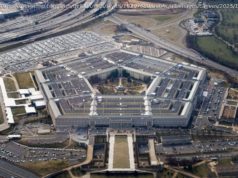Mr. Trump made the comment in a conversation with the president of Mexico in January, according to a transcript of the call published on Thursday.
New Hampshire politicians criticized President Trump after a transcript of a phone call with the president of Mexico published on Thursday showed he called the state “a drug-infested den.”
The remark came during his comments on the drug trade, criminal gangs and how he said they affected the state, according to a transcript of the Jan. 27 call published by The Washington Post.
“The drug lords in Mexico are knocking the hell out of our country, ” Mr. Trump told President Enrique Peña Nieto of Mexico.
“They are sending drugs to Chicago, Los Angeles and to New York, ” Mr. Trump continued. “Up in New Hampshire — I won New Hampshire because New Hampshire is a drug-infested den — is coming from the southern border.”
New Hampshire politicians and residents took issue with at least two elements of Mr. Trump’s statement: Many were offended at the way he described their state. Also, he did not win the state in the general election; he did win the Republican primary there.
“The president is wrong, ” said Gov. Chris Sununu of New Hampshire, a Republican. “It’s disappointing his mischaracterization of this epidemic ignores the great things this state has to offer.”
Senator Maggie Hassan, Democrat of New Hampshire, called his remarks “disgusting” and said on Twitter that her state was no different from any other that was battling widespread opioid abuse. Senator Jeanne Shaheen, also a Democrat, agreed.
“It’s absolutely unacceptable for the President to be talking about NH in this way, ” she wrote on Twitter . “A gross misrepresentation of NH & the epidemic.”
Addiction to opioids — a category of drugs that includes heroin and fentanyl — is the most lethal drug epidemic in American history.
Drug overdoses killed more people in 2016 than guns or car accidents — an estimated 59,000 people, according to data analyzed by The New York Times — and are now the leading cause of death for Americans under the age of 50.
More than 97 million people in the United States took prescription painkillers in 2015, according to the Substance Abuse and Mental Health Services Administration. An estimated 12 million of those did so in ways that were not sanctioned by a doctor, it said.
New Hampshire has been hit hard, and residents repeatedly raised the issue with presidential candidates during the 2016 campaign.
There were an estimated 470 drug overdose deaths in New Hampshire in 2016, compared with 439 in 2015. In 2012, there were 163, according to statistics compiled by the New Hampshire Department of Health and Human Services.
On Thursday, Mr. Sununu described the opioid epidemic in an email as “one of the worst health crises this state has ever experienced.” He said the government had doubled the resources devoted to prevention, treatment and recovery efforts.
He said it had also spent millions of dollars on prevention programs for children, law enforcement to end drug trafficking and initiatives to expand the availability of naloxone, which is used to treat drug overdoses.






